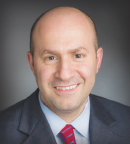An updated analysis of the phase III KEYNOTE-564 trial continues to support the use of adjuvant pembrolizumab vs placebo in patients with renal cell carcinoma at high risk of recurrence, according to a presentation at the 2022 ASCO Genitourinary Cancers Symposium.1 At 30 months of follow-up, patients at high and intermediate-high risk treated with adjuvant pembrolizumab had a significant disease-free survival improvement over placebo (P < .0001); the benefit persisted over time, and there were no new safety signals at the updated analysis.1
“KEYNOTE-564 was the first positive adjuvant trial to show immunotherapy works in high-risk renal cell carcinoma [after nephrectomy or nephrectomy and resection of metastatic lesions], and primary results were formally presented at the plenary session of ASCO 2021. At the 2022 ASCO

Toni K. Choueiri, MD
Genitourinary Cancers Symposium, we presented 30-month follow-up, updated from the previously reported 24 months. What we saw is that after 6 additional months of follow-up, the hazard ratio went from 0.68 to 0.63, so we had more events for disease-free survival. That was the primary endpoint, and it remained highly statistically significant,” said lead author Toni K. Choueiri, MD, Director of the Lank Center for Genitourinary Oncology, Dana-Farber Cancer Institute, Brigham and Women’s Hospital, and Jerome and Nancy Kohlberg Chair and Professor of Medicine at Harvard Medical School.
Dr. Choueiri continued: “We did an update on adverse events to see whether there were any new signals with additional follow-up, and there were not. We concluded that this updated analysis of KEYNOTE 564 further supports adjuvant pembrolizumab as a new standard of care in patients with renal cell carcinoma with risk features for recurrence.”
Previously reported data from KEYNOTE-564 found that with 24 months of follow-up, adjuvant pembrolizumab led to a statistically significant and clinically meaningful disease-free survival benefit vs placebo in the intent-to-treat population (P = .001).2 The recent presentation consisted of an updated efficacy and safety analysis with 30.1 months of follow-up.
Study Details
KEYNOTE-564 enrolled 994 patients with renal cell carcinoma classified as intermediate-high risk (pT2, grade 4 or sarcomatoid, N0, M0; pT3, any grade, N0, M0), high risk (pT4, any grade, N0, M0; any pT, any grade, N+, M0), and M1 no evidence of disease following surgery. Patients were randomly assigned 1:1 to receive pembrolizumab at 200 mg every 3 weeks (n = 496) or placebo every 3 weeks (n = 498).Baseline characteristics were well balanced in the two treatment arms.
In the earlier analysis at 24 months, the estimated disease-free survival rate was 78.3% with pembrolizumab vs 67.3% with placebo. The estimated overall survival rate at 24 months was 96.2% with pembrolizumab vs 93.8% with placebo.
Updated Findings
In the updated analysis with 30 months of follow-up, the benefit of pembrolizumab was maintained for disease-free survival, with a 37% improvement vs placebo. In intermediate-risk patents, pembrolizumab achieved a 32% improvement in disease-free survival, a 40% improvement in high-risk patients, and a 72% improvement in the subgroup of M1 no evidence of disease.
Overall survival was not significantly different at this time point. Longer follow-up is needed to determine whether there is an improvement in overall survival, said Dr. Choueiri.
MORE INFORMATION
For more on the updated findings from the KEYNOTE-564 trial on adjuvant pembrolizumab in high-risk renal cell carcinoma, see an interview with Toni K. Choueiri, MD,
on The ASCO Post Newsreels at ascopost.com/videos.
In terms of safety, with 24 months of follow-up in the primary analysis of KEYNOTE-564, 96% of patients treated with pembrolizumab experienced an all-cause adverse event vs 91% in the placebo group. In the updated safety analysis, the percentages of patients in the pembrolizumab arm and placebo arm experiencing an all-cause adverse event were unchanged; grade 3 or 4 adverse events were similar at both time points for both arms. “The safety was virtually identical at 24 months and 30 months,” he commented.
DISCLOSURE: Dr. Choueiri reported a financial and/or nonfinancial relationship with Alexion Pharmaceuticals, Alligent, Analysis Group, ASCO, AstraZeneca, Bayer, Bristol Myers Squibb, Cerulean Pharma, Clinical Care Options, Corvus Pharmaceuticals, Eisai, EMD Serono, Exelixis, Foundation Medicine, Genentech/Roche, GlaxoSmithKline, Harborside, Heron, Ipsen, Kidney Cancer Journal, The Lancet Oncology, Lilly, Lpath, Merck, Janssen, Michael J. Hennessy Associates, Navinata Healthcare, NCCN, The New England Journal of Medicine, Novartis, Peloton Therapeutics, Pfizer, PlatformQ Health, Prometheus, Sanofi/Aventis, and UpToDate. He has received institutional research funding from Agensys, Analysis Group, AstraZeneca, Bayer, Bristol Myers Squibb, Calithera Biosciences, Celldex, Cerulean Pharma, Congressionally Directed Medical Research Programs, Corvus Pharmaceuticals, Eisai, Exelixis, Foundation Medicine, Gateway for Cancer Research, GlaxoSmithKline, Ipsen, Merck, National Cancer Institute, Novartis, Peloton Therapeutics, Pfizer, Prometheus, Roche/Genentech, Seattle Genetics/Astellas, Takeda, and Tracon Pharma; holds international patents for biomarkers and has other relationships with ClinicalThinking, Envision Pharma Group, Fishawack Group of Companies, Health Interactions, and Parexel (medical writing assistance). He holds stock or other ownership interests in Pionyr Immunotherapeutics and Tempest Therapeutics.
REFERENCES
1. Choueiri TK, Tomczak P, Park SH, et al: Pembrolizumab as post nephrectomy adjuvant therapy for patients with renal cell carcinoma. 2022 ASCO Genitourinary Cancers Symposium. Abstract 290. Presented February 19, 2022.
2. Choueiri TK, Tomczak P, Park SH, et al: Adjuvant pembrolizumab after nephrectomy in renal-cell carcinoma. N Engl J Med 385:683-694, 2021.


